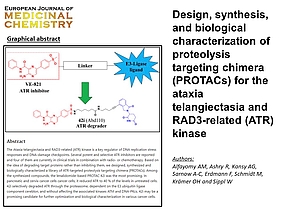New publication from the Krämer lab on the design, synthesis, and biological characterization of proteolysis targeting chimera (PROTACs) for the ataxia telangiectasia and RAD3-related (ATR) kinase
Alfayomy AM, Ashry R, Kansy AG, Sarnow A-C, Erdmann F, Schmidt M, Krämer OH and Sippl W (2024) Design, synthesis, and biological characterization of proteolysis targeting chimera (PROTACs) for the ataxia telangiectasia and RAD3-related (ATR) kinase. Eur J Med Chem, doi: 10.1016/j.ejmech.2024.116167
Abstract:
The Ataxia telangiectasia and RAD3-related (ATR) kinase is a key regulator of DNA replication stress responses and DNA-damage checkpoints. Several potent and selective ATR inhibitors are reported and four of them are currently in clinical trials in combination with radio- or chemotherapy. Based on the idea of degrading target proteins rather than inhibiting them, we designed, synthesized and biologically characterized a library of ATRtargeted proteolysis targeting chimera (PROTACs). Among the synthesized compounds, the lenalidomide-based PROTAC 42i was the most promising. In pancreatic and cervix cancer cells cancer cells, it reduced ATR to 40 % of the levels in untreated cells. 42i selectively degraded ATR through the proteasome, dependent on the E3 ubiquitin ligase component cereblon, and without affecting the associated kinases ATM and DNA-PKcs. 42i may be a promising candidate for further optimization and biological characterization in various cancer cells.
Read the full paper here: https://www.sciencedirect.com/science/article/pii/S0223523424000473?via%3Dihub

